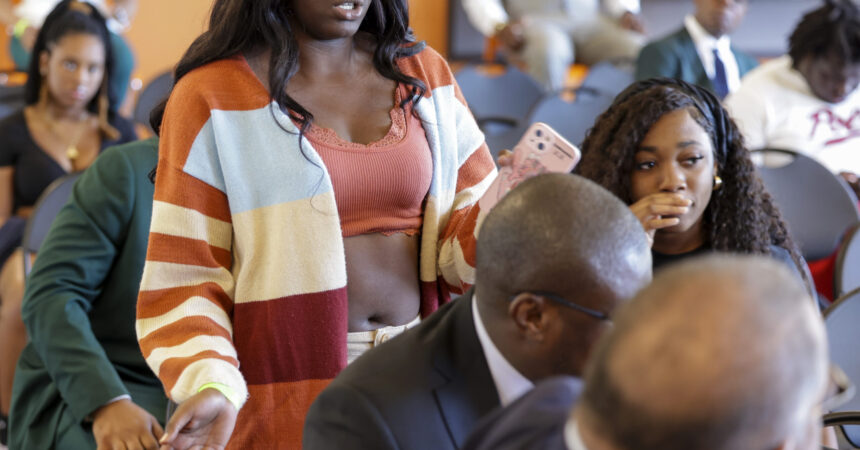
Myths dispelled at medical marijuana forum

Photo by Glenn Beil

Photo by Glenn Beil

Photo by Glenn Beil

By St. Clair Murraine
Outlook Staff Writer
Some of the most common myths about marijuana make the leafy plant seem like a miracle drug.
In some cases, it might be. Then, there are cases like those Terel Newton and Erin Boyd have seen. For both medical doctors some cases have been life-threatening.
The way they put it is there is bad marijuana and good marijuana. Medical marijuana is always good, while the bad one is illegal and very common on the streets.
Boyd and Newton spent most of their time in front of a crowd taking questions as members of a panel. The doctors, law enforcement officers and others in the medical marijuana field came to give the 411 on 4/20 inside a meeting space at one of the South Towers on FAMU’s campus.
The awareness event took place on April 20, a day that has become popular because in the early 1970s five high school students met daily at 4:20 to smoke marijuana. Last Thursday’s presentation was part of the Medical Marijuana Education and Research Initiative, which is exclusive to FAMU.
Part of the MMERI mission is to educate communities on the medical benefits of cannabis and how consuming illegal marijuana today could be like Russian Roulette.
“For me it’s a safety concern with patients,” said Newton, medical director with Trulieve and a board certified anesthesiologist. “I’ve even had a patient to take a CBD gummy and go unconscious. We found out later that it was laced with fentanyl. The person had to go to the ER, had tests done and had a breathing tube put in.”
Boyd debunked another myth that has become common since the 2016 legalization of medical marijuana. Legal marijuana doesn’t mean that what’s sold on the street is as safe as what’s recommended by a qualified physician, she said.
“Everybody thinks marijuana; it’s safe and people want to do it and it has a lot of health benefits,” said Boyd, an emergency medicine physician at TMH and owner of Novel Mind and Wellness Center. “I don’t think people realize that as the doses and concentration of THC has increased in weed over 10-20 years we are seeing people want to relax to lessen their anxiety, (but) people are having the opposite reaction.”
Studies leading up to the approval of medical marijuana in Florida show that cannabis could be used for treating conditions that include cancer, epilepsy, glaucoma, chronic pain, PTSD, and HIV/AIDS. Since its legalization, more than 2,000 Florida physicians have become certified to recommend medical marijuana.
“This is a very, very huge day because it’s national week day for enthusiasts who use marijuana,” said Michelle Wilson, manager of community engagement, outreach and engagement with the MMERI program. “We are taking this opportunity to educate our students and community about using medical marijuana; what is that process, what does it look like (and) what are the conditions that the legislature had authorized marijuana to treat.”
While the MMERI program is making headway to educate a diverse cross-section of communities across Florida about medical marijuana, law enforcement has struggled with what’s sold on the streets. Anthony Washington, outreach coordinator for FAMU MMERI, is a retired law enforcement officer.
Catching up with street activities remains a challenge as judges are struggling with sentencing illegal users, said Washington, former president of the Drug and Alcohol Testing Industry Association.
Putting on its latest awareness event in the building that houses students was fitting, said DeAndrae Smith, an ambassador for students for sensible drug policies at FAMU. However, he noted that getting the message about marijuana to students has to be ongoing.
Knowing might inspire some students to get into the business, he added.
“I feel like the cannabis industry is something more students should take a hold of and get access to,” Smith said. “I don’t think they are ignorant. I just don’t think they’re educated.
“We always look on that black market side of it; the street life. You don’t know that there is a tested product (and) it’s better than that street product. You don’t know what that man is doing to that street product because he has no licenses.”







